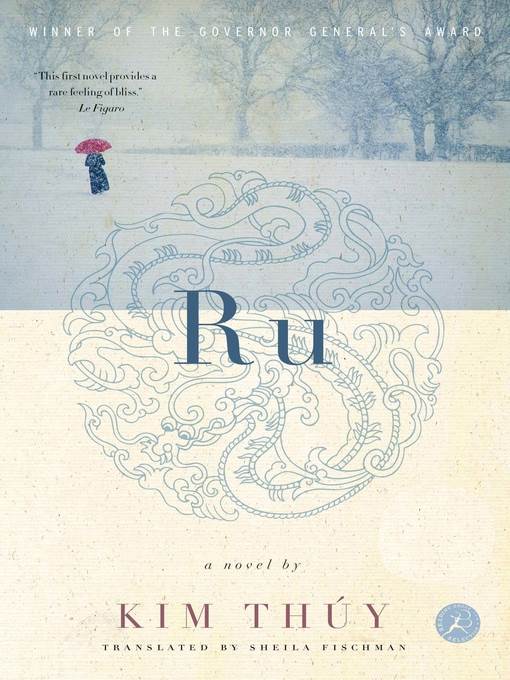
Ru
A Novel
کتاب های مرتبط
- اطلاعات
- نقد و بررسی
- دیدگاه کاربران
نقد و بررسی

September 17, 2012
Rendered in spare vignettes, Kim’s lyrical debut novel is an autobiographical impression of motherhood and exile. Forced to flee their privileged, intellectual life in Communist Saigon, Nguyen An Tinh (an “extension” of her almost identically named mother and a stand-in for Thúy), born during the Tet offensive, navigates the Gulf of Siam bound for a Malaysian refugee camp, where she and her family live for several months before making their way to Canada. There, Nguyen is blinded by the whiteness of the snow and the blankness of her slate. But her new home quickly makes its marks—she learns French and English, what to wear in the harsh Quebecois winters, and the ways in which the American dream extends its reach around the globe. The narrative wanders through time as Nguyen mourns her autistic son’s inability to say maman, recalls her childhood in Vietnam, and muses on the fork in her family tree that her life in the West represents. But like the married men Nguyen prefers, whose “ring fingers with their histories keep me remote, aloof, in the shadows,” the disjointed narrative keeps readers at a distance, allowing tender glimpses of Nguyen’s pain, but never fully exposing her. Agent: Ron Eckel, Cooke Agency.

October 1, 2012
In her slim, partly autobiographical first novel, Thuy, a Vietnamese-Canadian writing in French, seeks to make sense through memories of a life straddling East and West. That life unfolds haphazardly. It belongs to Nguyen An Tinh. She was born into a prosperous family in Saigon in 1968. When the Communists took over seven years later, they also took over part of their house. In 1978, the family became boat people, crossing the pirate-infested Gulf of Siam to reach Malaysia. From a foul refugee camp there, they traveled to Canada. Their first year was "heaven on earth," and the country became their new home. At some point, Nguyen married a white Westerner and gave birth to twins, one of them autistic. So, you can package these details neatly, but it's not something Thuy cares to do, preferring a montage to a chronological narrative, a progression sustained by images of family life. Some of the family members make the cut because they're so colorful. There's Uncle Two (so named because he is the second born), a prominent Saigon politician and playboy who will report his fleeing sons to the Communist authorities; and retarded, unmarried Aunt Seven, who will mysteriously give birth in a convent. Nguyen's mother, a disciplinarian, runs their Saigon house, while her father, puzzlingly, is a blank; both parents take menial jobs in Canada for their children's future. Her husband only rates one mention; perhaps this is because she considers men "replaceable." (Maternal love is the only love that counts.) Nguyen herself, a silent, self-effacing shadow as a child, slowly blossoms; on a return journey to Vietnam, she understands how her fragile Vietnamese psyche has been covered by the armor of Western self-confidence. What has she learned? Travel light; don't regret what's past; enjoy "the unspeakable beauty of renewal." As a quest for identity, Thuy's work is not altogether satisfying, but her powerful scene-setting makes her a writer to watch.
COPYRIGHT(2012) Kirkus Reviews, ALL RIGHTS RESERVED.

June 1, 2012
Ten years old in 1978 when her family fled lotus-scented Saigon for Quebec, Thuy picked vegetables and sewed clothes to put herself through school and has worked variously as a lawyer, translator, and restaurateur. When she got the urge to write, the result was not memoir but a fictionalized account of her immigrant experiences that won Canada's Governor General Award. Good for discussion; early buzz campaign.
Copyright 2012 Library Journal, LLC Used with permission.

Starred review from September 1, 2012
Less is more in this slim, award-winning autobiographical novel. Vignettes that ignore chronology flow smoothly together to tell the first-person story of Nguyen An Tinh, born during the Tet Offensive into a large extended family of means in Saigon. After the Communist takeover of the city, Nguyen's family escapes under dreadful conditions by boat to Malaysia and a horrendous, vastly overcrowded refugee camp before reaching safety in Quebec. Decades later, when Nguyen's work takes her to Hanoi, she experiences the pull of her homeland through all her senses. But these are just the bare bones of this stream of memories, which goes beyond the refugee experience to touch on war and peace, the strength of maternal love, even the devastation of autism. Elements of humoras when the Communist inspectors at the family's home are angry to find that the live fish they kept in the toilet bowl for a meal was gone the next dayare just grace notes to the prevailing evocation of pain, perseverance, gratitude, and love. Ru means stream in French and lullaby in Vietnamese. Both meanings are apt for this luminous first novel of memories strung together with concise yet lyrical and sensuous prose.(Reprinted with permission of Booklist, copyright 2012, American Library Association.)

























دیدگاه کاربران